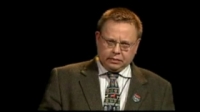Estonian professor offers to refuse cash
 On November 20, 2010, Macroeconomics Professor Raul Eamets spoke at the TEDxTartu conference at the University of Tartu. His speech was devoted to an interesting idea: a complete transition to non-cash payments to stimulate the development of the economy, IT infrastructure and the banking sector. Such a move will also strengthen the image of Estonia as one of the IT leaders in the eyes of the world community.
On November 20, 2010, Macroeconomics Professor Raul Eamets spoke at the TEDxTartu conference at the University of Tartu. His speech was devoted to an interesting idea: a complete transition to non-cash payments to stimulate the development of the economy, IT infrastructure and the banking sector. Such a move will also strengthen the image of Estonia as one of the IT leaders in the eyes of the world community.The article presents the main theses (Estonian language, automatic translation ) and video of the speech.
During the speech, the professor conducted a mini-survey among those present and it turned out that every third person in his pocket has less than one euro in cash, whereas 100% have plastic cards.
Estonians and now very actively use non-cash payments. For example, in the retail trade in Estonia about 60-70% of payments are non-cash (for comparison, in Russia - 3.8% , in Belarus - 7.3% ).
')
At the same time, there are convincing calculations that switching to non-cash payments “automatically” increases GDP in the country, that is, plastic cards are useful for the economy by themselves, because they ensure full transparency of all payments and reduce the share of the “gray” economy.
Professor Emets believes that it is now convenient to give up cash, since on January 1, 2011, Estonia will officially complete the transition to the euro.
However, even if you completely ban cash, there will still be loopholes for financial fraud. For example, if you want to lend your friend a large sum of money secretly from the tax office, you can buy a few grams of gold and give it to him. Well, a law-abiding person will simply transfer money to a friend by bank payment, benefiting both banking and IT infrastructure, and the economy as a whole.
On this topic:
Estonian Information System
Source: https://habr.com/ru/post/108596/
All Articles